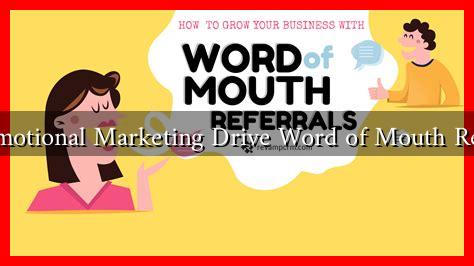-
Table of Contents
Can Emotional Marketing Drive Word of Mouth Referrals?
In today’s competitive marketplace, businesses are constantly seeking innovative ways to engage customers and encourage them to share their experiences. One powerful strategy that has emerged is emotional marketing, which taps into the feelings and emotions of consumers to create a deeper connection with a brand. This article explores how emotional marketing can drive word-of-mouth referrals, enhancing brand loyalty and customer advocacy.
Understanding Emotional Marketing
Emotional marketing is a strategy that focuses on creating an emotional response in consumers. By appealing to feelings such as happiness, nostalgia, fear, or empathy, brands can foster a stronger connection with their audience. This approach is grounded in the understanding that consumers often make purchasing decisions based on emotions rather than logic.
The Power of Word of Mouth Referrals
Word of mouth (WOM) referrals are one of the most effective forms of marketing. According to a study by Nielsen, 92% of consumers trust recommendations from friends and family more than any other form of advertising. WOM referrals not only enhance brand credibility but also lead to higher conversion rates. When customers share their positive experiences, they become brand advocates, influencing others to make similar purchasing decisions.
How Emotional Marketing Fuels Word of Mouth
Emotional marketing can significantly enhance the likelihood of word-of-mouth referrals through several key mechanisms:
- Creating Memorable Experiences: Brands that evoke strong emotions create memorable experiences that consumers are likely to share. For instance, Coca-Cola’s “Share a Coke” campaign personalized bottles with names, encouraging customers to share their experiences on social media.
- Building Trust and Loyalty: Emotional connections foster trust. When consumers feel emotionally connected to a brand, they are more likely to recommend it to others. A study by the Harvard Business Review found that emotionally connected customers are more than twice as valuable as highly satisfied customers.
- Encouraging Storytelling: Emotional marketing often leads to storytelling, which is a powerful tool for engagement. Brands like Apple and Nike have successfully used storytelling to create emotional narratives that resonate with their audience, prompting customers to share their own stories.
- Facilitating Community Building: Brands that evoke emotions often create communities around shared values and experiences. For example, TOMS Shoes has built a community of socially conscious consumers who share their commitment to giving back, leading to increased referrals.
Case Studies: Successful Emotional Marketing Campaigns
Several brands have successfully leveraged emotional marketing to drive word-of-mouth referrals:
- Always – #LikeAGirl: This campaign challenged gender stereotypes and empowered young girls. The emotional resonance of the message led to widespread sharing on social media, significantly increasing brand visibility and advocacy.
- Google – Year in Search: Each year, Google releases a video summarizing the most searched topics, often highlighting human stories of resilience and hope. These videos evoke strong emotions, leading to millions of shares and discussions across various platforms.
- Airbnb – Belong Anywhere: Airbnb’s marketing emphasizes belonging and community. By sharing stories of hosts and guests, the brand creates an emotional connection that encourages users to share their own experiences, driving referrals.
Statistics Supporting Emotional Marketing
Several statistics underscore the effectiveness of emotional marketing in driving word-of-mouth referrals:
- According to a study by the Institute of Practitioners in Advertising, emotional campaigns outperform rational campaigns by a factor of 2 to 1.
- Research from the Advertising Research Foundation found that ads with emotional content performed twice as well as those with purely rational content.
- A study by the American Marketing Association revealed that emotionally connected customers are 60% more likely to recommend a brand to others.
Conclusion
Emotional marketing is a powerful tool that can significantly enhance word-of-mouth referrals. By creating memorable experiences, building trust, encouraging storytelling, and facilitating community building, brands can foster deeper connections with their audience. As demonstrated by successful campaigns from companies like Always, Google, and Airbnb, tapping into emotions can lead to increased customer advocacy and loyalty. In a world where consumers are bombarded with advertising, emotional marketing stands out as a compelling strategy to drive referrals and ultimately, business success.
For more insights on emotional marketing and its impact on consumer behavior, you can explore resources from Forbes.

